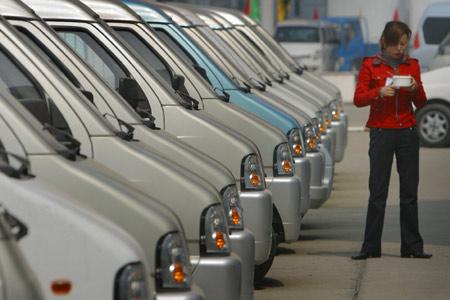
|
|
SAIC-GM-Wuling minivans are lined up at a dealership in Nanjing, Jiangsu province. The company has held the top sales position in China's minivan sector for four years. [China Daily] |
BEIJING - After reporting strong annual sales in China last year, SAIC-GM-Wuling, General Motors' Chinese joint venture in Guangxi Zhuang autonomous region, is charting further expansion of its product portfolio and capacity.
"The year of 2010 will be a milestone for SAIC-GM-Wuling," said Yang Jie, general manager of the sales branch under the three-way tie-up between GM, SAIC Motor Corp and Wuling Motors, which is owned by the local government.
"We will launch a self-developed brand in the medium-sized sedan segment to improve our competitiveness, aiming for long-term and sustainable development in the future," said Yang.
"The passenger car will be our company's focus this year, while we still persevere to maintain our dominant leadership in the light commercial vehicle market in China."
Yang told China Daily that Wuling has started to establish the distribution network for the new brand, but refused to disclose the timetable for the passenger car project.
The new car, based on the prototype of GM's Excelle model, is under development in the Pan-Asia Technical Automotive Center, a joint venture between GM and SAIC.
"With our years of experience in operating GM's Chevrolet Spark car in research and development, parts sourcing, manufacturing, sales and services, we are confident about our own passenger car brand," said Yuan Zhijun, the company's vice-general manager.
The company has kept the top position in China's minivan sector for four years. It made an industry record of selling one Wuling minivan every five seconds, on average, in 2009 or 1.06 million units.
GM has begun to sell Wuling vehicles under its Chevrolet badge in Brazil, and listed Wuling into its global brand family.
GM also cooperated with its Chinese partner SAIC to produce cars and Wuling minivans in India this year, aiming for similar success throughout the developing world, where they are seeking a new growth engine other than waning Western markets.
Yang told China Daily that the Wuling minivan's success should contribute to the company's low-cost business model and commitment to bringing customers value.
"And we will replicate this low-cost business strategy in our new passenger car brand," said Yang.
"To be on the safe side, we (estimate) our total sales this year will reach 1.23 million units," he said.
With demand increasing and the planned launch of a new brand, Wuling has decided to expand its annual capacity at its Liuzhou plant from 590,000 units to 800,000 units by the end of 2012. It will also add 210,000 units of output to its Qingdao plant this year.
Seeing higher requirements from small- and medium-sized enterprises as well as private entrepreneurs in rural regions and small cities, Wuling launched the Hong Guang compact business vehicle last month.
"It's a new vehicle segment with huge potential as the income of Chinese people in rural regions increased by large scale in the past year amid the robust local economy," said Yang.
"To keep the leadership in our target market in rural regions, we have to shift our production strategy flexibly to well suit to the customers."





